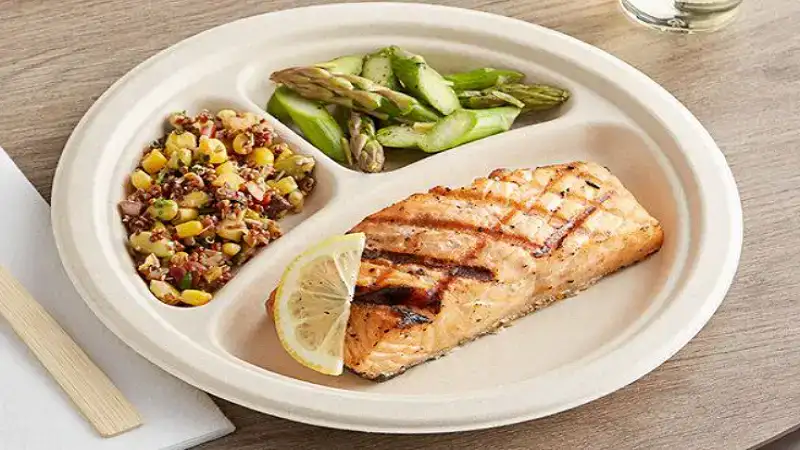“Why did half the plates bend under the ribs?” asked Mike, the event organizer.
“They were ‘eco-friendly,’ but they couldn’t handle the weight,” sighed Sarah, his assistant.
“Guests loved the sustainability message,” Mike added, “but the spills ruined the catering service.”
This dialogue captures the pain point of modern eco-conscious events: everyone loves sustainable tableware, but not all compostable plates are built for real food-service conditions. The fatal detail? Many products marketed as “green” fail when tested against hot, greasy, and heavy meals.
This blog explores the science, data, and real-world performance of compostable plates—highlighting how suppliers like Bioleader® are setting new benchmarks for durability, compliance, and true sustainability.
The Global Shift: From Plastic Plates to Compostable Alternatives
Regulatory Push
Governments worldwide are phasing out single-use plastics. By 2025, over 120 countries will enforce bans or strict regulations on disposable plastic tableware. For businesses, switching to compostable plates is no longer optional—it is regulatory compliance.
Consumer Pull
A 2024 McKinsey survey revealed that 67% of consumers are willing to pay more for food served in sustainable packaging. Eco-friendly plates have moved from niche to mainstream expectation, particularly in catering, quick-service restaurants, and outdoor events.
Case Study: Festival Dining
At a European summer festival, organizers switched from plastic to bagasse paper plates. Post-event surveys showed a 22% increase in customer satisfaction scores linked directly to the dining experience. The plates were sturdy, grease-resistant, and compostable—leading to faster cleanup and reduced landfill waste.
Why Some Compostable Plates Still Fail
Weak Fiber Composition
Not all “eco plates” are equal. Many cheaper variants use thin pulp or recycled fiber without reinforcement, making them unsuitable for oily or heavy foods.
Heat & Grease Resistance
Plates without proper structural engineering warp under hot dishes or absorb grease, weakening the material mid-meal.
Real-World Misalignment
A plate may pass a lab test but fail in practice when stacked under trays of barbecue, curries, or stir-fried noodles.
Bioleader®’s Innovation: Compostables Built for Performance
Unlike generic products, Bioleader® has developed compostable plates with tested rigidity, grease resistance, and certified compostability. Their collections have been featured in packaging industry news as benchmarks for combining sustainability with real-world utility.
Bagasse Paper Plates
The bagasse paper plates are made from sugarcane fiber residues. They are PFAS-free, industrially compostable, and strong enough to carry full-course meals without sagging.
10-Inch Paper Plates
Bioleader®’s 10-inch paper plates provide the perfect size for catering events, balancing convenience with strength. They are widely chosen by restaurants and outdoor event organizers who need a reliable, eco-friendly alternative.
Compostable Plates Description
Their compostable plates come with full certification details, ensuring global export compliance. By meeting EN13432 and ASTM D6400 standards, they pass the strictest compostability audits.
Sugarcane Fiber Plates
The sugarcane fiber plates not only withstand heat and oil but also decompose completely in industrial composting facilities. They have been highlighted in case studies for reducing catering waste by over 70% at corporate events.
Bagasse Plates Collection
The complete bagasse plates category offers a full range of sizes, enabling catering companies to standardize lids and reduce SKU complexity. This helps streamline procurement and logistics while maintaining eco-credibility.
Data-Driven Advantages of Compostable Plates
- Decomposition: Bagasse plates degrade within 90 days in industrial composting conditions.
- Carbon footprint: Studies show bagasse has 50% lower emissions than plastic across the lifecycle.
- Consumer impact: Events using compostable plates report higher satisfaction scores linked to cleanliness, feel, and sustainability.
- Business value: Operators reduce landfill fees and improve compliance readiness, often offsetting the higher unit price of compostables.
Best Practices for Food Businesses Adopting Compostable Plates
- Audit menu requirements: Heavy BBQ vs. light salads require different structural strengths.
- Choose certified suppliers: Always demand EN13432/ASTM certification documents.
- Pilot with high-stress foods: Test plates with hot soups, oily curries, or ribs to simulate peak demand.
- Standardize sizes: Adopt 10-inch and shared-diameter families to reduce SKU counts.
- Track KPIs: Measure refund rates, plate breakage, and cleanup time savings.
Frequently Asked Questions
Are bagasse plates microwave-safe?
Yes. Bagasse plates can withstand microwave reheating at moderate temperatures, making them suitable for catering and takeaway meals.
How long do sugarcane fiber plates take to decompose?
In industrial composting, sugarcane fiber plates break down in about 90 days, aligning with EN13432 standards.
Do compostable plates cost more than plastic?
Initially, unit costs are slightly higher, but businesses save through reduced landfill fees, compliance avoidance penalties, and improved brand value.
Can compostable plates hold greasy or oily foods?
High-quality sugarcane fiber and bagasse plates resist grease and maintain rigidity, making them ideal for oily foods like curries and barbecues.
Are Bioleader® compostable plates accepted worldwide?
Yes. With EN13432 and ASTM certifications, Bioleader® plates are export-ready for Europe, North America, and Asia-Pacific markets.
Conclusion: Back to the BBQ
The opening scene showed guests frustrated with flimsy “eco plates.” The lesson is clear: sustainability without strength is self-defeating.
By adopting bagasse paper plates, 10-inch certified compostable plates, sugarcane fiber solutions, and full category bagasse ranges, food businesses can serve heavy meals with confidence while meeting 2025 regulatory demands.
Bioleader® has proven that compostable plates can be both eco-friendly and operationally flawless. If your plates can hold a rack of ribs without bending, they can also hold your brand’s reputation for years to come.

